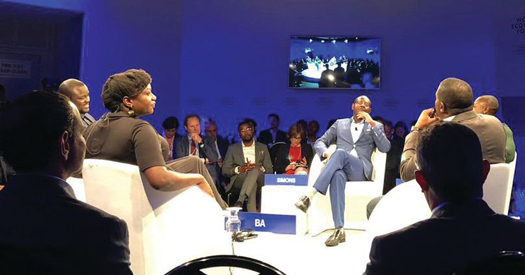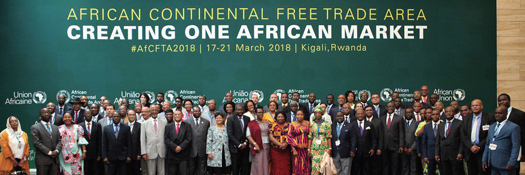In the midst of economically-driven violence, S. Africa hosts World Economic Forum on Africa
By Jehron Muhammad | Last updated: Oct 2, 2019 - 9:07:11 AMWhat's your opinion on this article?

A panel discussion at the 28th World Economic Forum on Africa, on Africa’s Innovators of the Year. Topics included, “Unique African challenges can often not be solved by technology or solutions from outside of the continent.”
|
In the midst of growing global press coverage about xenophobic violence, South Africa hosted the 28th World Economic Forum on Africa in Cape Town.
The rallying cry of the meeting in early September was ratification of the Africa Continental Free Trade Area (AfCFTA).

|
South African president Cyril Ramaphosa, whose country is for the third time a non-permanent member of the United Nations Security Council, was elated by AfCFTA’s possibilities for development on the continent. “The future is great, it looks very bright for the African continent, and if there was ever a time when Africa can definitely be said to be on the rise, this is the time,” he said.
According to Kim Cloete, the official scribe for the African Forum, AfCFTA is set to become the world’s largest free trade area, encompassing 54 African countries.
“After years of talks, the goal is to establish a single market for goods and services across 54 countries, to allow the free movement of business travelers and investments, and create a congenital customs union to streamline trade—and attract long-term investment.
“The agreement is seen as critical for growth and job creation for Africa and its 1.27 billion people. Clinching Nigeria’s agreement and moving into the operational phase this (past) July was a significant step …”
Arancha Gonzalez Laya, executive director of the International Trade Centre, said, “We now have leaders of 54 countries putting their neck on the line for this agreement. It’s a game-changer. There’s much more political energy today than there has ever been on integration.”
An entire session at the Forum was devoted to “Delivering the Promise of Africa’s Youth.”

|
“Eighteen percent for a country like Botswana is a scary figure. And when you unpack it, even the more … out of that 18 percent the majority are young people, fairly well educated ... with a lot of expectations for the future. And yet the burden of frustration of not being able to find jobs could easily be offset and cause such people to venture into other things that may not be as desirable,” he said. “So, yes, it’s a ticking time bomb.”
Albert Zeufack, World Bank’s chief economist for Africa, put an exclamation point on President Masisi’s remarks. “It’s a threat if we don’t get that population to start really working,” he said.
The Forum responded to scheduled protests outside the Cape Town International Convention Center, that focused on the rise of attacks on women in South Africa with a live-streamed discussion. Titled: “Eradicating Violence against Women,” panelists at the session listed steps to combat such violence and spelled out the social and economic consequences of failing to act.
If not for financial publications and pages, and the African Forum using its platform to highlight Africa’s growing youth population and violence against women, media reports might have focused solely on violence against African migrants in South Africa.
Pressed by regional African leaders, South Africa’s special envoy, Jeff Radebe, relayed a message to Nigerian President Muhammadu Buhari from President Ramaphosa. Attacks on Nigerians and other Africans do not represent South Africa’s value system, nor the sentiment of the majority of South Africans, he said.

Ratifi cation of the Africa Continental Free Trade Area (AfCFTA) was a priority at the World Economic Forum on Africa. Photos: Twitter
|
President Ramaphosa announced he would send high-ranking emissaries to reassure African nations in the wake of xenophobic attacks where their nationals were targeted. Nigeria’s president thanked his South African counterpart for sending a special envoy.
Mozambican President Filpe Nyusi condemned the violence against Africans in South Africa. Privately-owned STV Noticias reported the president said over 500 Mozambicans had lost their homes in South Africa due to violence.
Nigerian officials, who africanews.com reported as most vocal, and President Buhari are scheduled to visit South Africa in October. But, more than 300 Nigerians arrived home after being evacuated from South Africa. Their shops and some homes were destroyed as frustrated South Africans, stung by poverty and deprivation, targeted them.
Local Nigerian media reported an Air Peace Airline plane with 314 Nigerians aboard landed at the Murtaia Muhammad International Airport. It was the second group of returnees following the return of 187 Nigerians the previous week.
With the UN General Assembly opening Sept. 17 in New York, President Ramaphosa decided, for good reason, against attending.
He said decided to remain in South Africa to “attend to the implementation of government’s urgent measures on gender-based violence, the restoration of order and stability in areas affected by public violence, and to oversee initiatives to turn around the economy.”
Perhaps President Ramaphosa should heed the words Dr. Nkosazana Dlamina Zuma, who ran against him for ANC president in 2017. The former chair of the African Union said, “It has always … been about economic liberation of all South Africans—but especially about economic justice for the Black majority.” Dr. Zuma’s campaign slogan was “Radical Economic Transformation now or never!” Clearly, she noted, “economic justice” has yet to be achieved. “We still live in a deeply unequal society, where the fault-lines of that inequality are primarily defined by race,” Dr. Zuma added.
Julius Malema and his Economic Freedom Fighters party have stressed the economic legacy of White minority rule and social effects of apartheid are at the root cause of recent violence against African migrants in South Africa.
Blame for economic problems is being laid at the feet of the ruling ANC, which since 1994, has pursued several goals, including emphasizing equity and redistribution of wealth, while also advocating rapid economic growth and corporate investment. But if corporate investment is a top priority, can wealth be redistributed?
AfCFTA is an opportunity for countries and companies to help each other grow. But trade liberalization also has the potential to hurt the poorest in African countries, so policies to support those at the bottom are important.
Follow @JehronMuhammad on Twitter.
INSIDE STORIES AND REVIEWS
-
-
About Harriett ... and the Negro Hollywood Road Show
By Rabiah Muhammad, Guest Columnist » Full Story -
Skepticism greets Jay-Z, NFL talk of inspiring change
By Bryan 18X Crawford and Richard B. Muhammad The Final Call Newspaper @TheFinalCall » Full Story -
The painful problem of Black girls and suicide
By Charlene Muhammad -National Correspondent- » Full Story -
Exploitation of Innocence - Report: Perceptions, policies hurting Black girls
By Charlene Muhammad -National Correspondent- » Full Story -
Big Ballin: Big ideas fuel a father’s Big Baller Brand and brash business sense
By Bryan Crawford -Contributing Writer- » Full Story






 Click Here Stay Connected!
Click Here Stay Connected!








